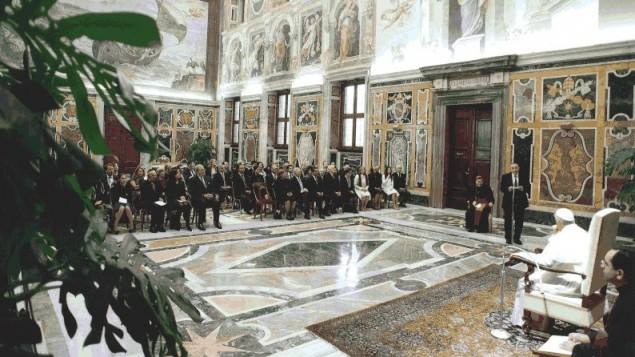31st October 2013
Christians and Jews: A Roman Initiative


The Israeli ambassador to the Holy See, Zion Evrony, recently took the initiative to invite diplomatic colleagues and officials of the Holy See to the Great Synagogue of Rome. The synagogue is one of the largest in Europe, built in 1870 between the Tiber and the old Jewish ghetto. The Chief Rabbi of Rome, Dr Riccardo Di Segni, and the President of the Pontifical Council for Culture, Cardinal Gianfranco Ravasi, spoke to the visitors about the intertwined cultural, intellectual, historical and social relationships between Jews and Christians in Rome and beyond. The Chief Rabbi reminded us that John Paul II was not the first Pope to visit a synagogue in Rome. That honour fell to St Peter, nearly two thousand years ago.
The Jewish Museum in the basement of the synagogue tells of the vibrant history of Rome’s Jewish community, displays some of their treasures, and also, of course, relates the dark times: the pogroms, the expulsions, and the round up of Jews in Rome by the Nazis in 1943. The Yad Vashem Holocaust Memorial Museum has in recent years been reconsidering and modifying its criticism of the role played by the Vatican and Catholic Church during WWII, most notably in relation to Pope Pius XII. Yet a recent exhibition marking 50 years of honouring the Righteous Among Nations is still cautious in its assessment: “The lack of overt and unequivocal guidance by the Vatican left the decision to initiate rescue of Jews to the heads of Catholic institutions. Some superiors of convents, monasteries and other institutions opened their doors to Jewish fugitives, sometimes with the knowledge of the Vatican. In some cases Bishops and other Catholic leaders called on their clergy and believers to help the Jews”.
There is real movement in the current relationship between the Holy See and global Judaism. In May last year, Cardinal Koch – the lead Vatican official on Jewish relations – told a gathering that: “the Catholic Church is obliged to denounce anti-Judaism … as a betrayal of its own Christian faith”. Pope Benedict XVI followed John Paul II in visiting the Great Synagogue in Rome. And Pope Francis’ own messages have been unequivocal. “Since the Second Vatican Council”, he has written, “we have rediscovered that the Jewish People are still for us the holy root that produced Jesus”. And in July, speaking to the International Jewish Committee for Interreligious Relations, the Pope said (and he has repeated it since): “Because of our common roots, a true Christian cannot be an anti-Semite”.
The Israeli Ambassador’s initiative was well timed. The windows are being opened, and fresh light cast on the complex and sometimes tragic history of the relationship between Christians and Jews. Just in the last month, Pope Francis has received a delegation from the Jewish Community in Rome on the 70th anniversary of the deportations, and representatives of the Simon Wiesenthal Centre in Vienna. A further step is likely to be taken next year, when Pope Francis – as is expected – visits Israel and Palestine. This is the right direction of travel.